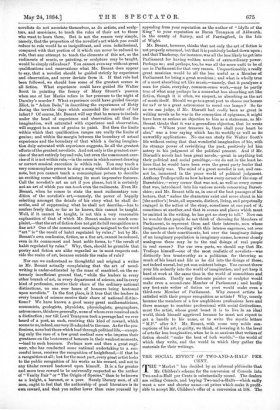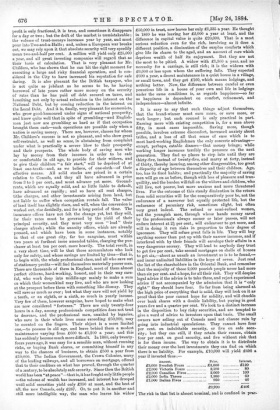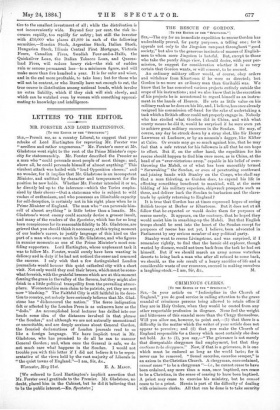THE SOCIAL EFFECT OF TWO-AND-A-HALF PER CENT.
THE " Market " has decided by an informal pl6biscite that Mr. Childers's scheme for the conversion of Consols into Two-and-a-Half per Cents is substantially sound. The dealers are selling Consols, and buying Two-and-a-Haifa—which sadly want a new and shorter name—at prices which make it profit- able to accept Mr. Childers's offer of a conversion at 108. The profit is only fractional, it is true, and sometimes it disappears for a day or two ; but the drift of the market is unmistakeable ; the • volume of trust-moneys increases year by year, and must pour into Two-and-a-Halfs ; and, unless a European war breaks out, we may rely upon it that absolute security will very speedily mean two-and-half per cent. A million will yield only £25,000 a year, and all great investing companies will regard that as their basis of calculation. That is very pleasant for Mr. Childers, who has shown that he can hit the right moment for executing a large and risky financial operation, and is con- sidered in the City to have increased his reputation for safe daring. It is also pleasant for the British taxpayer, who is not quite so jubilant as he seems to be, he having borrowed of late years rather more money on the security of rates than he has paid off debt secured on taxes, and benefiting not only by actual reduction in the _interest on the National Debt, but by coming reduction in the interest on the Local Debt. And it is, finally, very pleasant for economists, who grow good-humoured under signs of national prosperity, and know quite well that in spite of grumbling—and English- men just now are grumbling as hard as if that occupation brought them cash—such operations are possible only when a nation is saving money. There are, however, classes for whom Mr. Childers's success is not so pleasant, and who show great self-restraint, as well as sense, in abstaining from complaint under what is practically a, severe blow to their prosperity and their prospects. The whole body of saving men who lay by money from their incomes in order to be safe or comfortable in old age, to provide for their widows, and to give their children " a fair start," will be deprived of at least one-tenth—and, as we believe, of one-sixth--of their effective means. All solid stocks are priced in a certain relation to Consols, and they all have advanced in price from 3 to 5 per cent., and must advance yet more. Ground- rents, which are equally solid, and as little liable to default, have advanced as rapidly ; and so have all rent charges, tithe charges, and other investments arising from land, but not liable to suffer when occupation rentals fall. The value of land itself has slightly risen, and will, when the conversion is worked out, rise decidedly, and for a long period of time. The insurance offices have not felt the change yet, but they will, for their rates must be governed by the yield of their principal security, and they must very soon " load" their charges afresh ; while the annuity offices, which are already pressed, and which have been in some instances, notably in that of one great city, far too sanguine, must .within two years at furthest issue amended tables, charging the pur- chaser at least ten per cent. more heavily. The total result, in a. very short time, will be that those accumulators who look only for safety, and whose savings are limited by time—that is, to begin with, the whole professional class, and all who save out of stationary profits—will find themselves materially poorer men. There are thousands of them in England, most of them almost perfect citizens, hard-working, honest, and in their way care- ful, who work deep into middle-age mainly to make a sum on which their womenkind may live, and who are now looking at the prospect before them with something like dismay. They will save as much as ever ; but what they save will not yield by a tenth, or an eighth, or a sixth, so much in yearly income. Very few of them, however sanguine, have hoped to make what are now considered "fortunes." There are only twenty-four hours in a day, among professionals competition does not tend to decrease, and the professional men, unaided by legacies, who save in their whole lives sums exceeding £50,000, may be counted on the fingers. Their object is a more limited one,—to possess in old age, and leave behind them a modest maintenance varying from £600 to £1,200 a year ; and this has suddenly become much more difficult. In 1860, only twenty- fours years ago, it was easy for a sensible man, without running risks, or buying Bank shares, or committing himself in any way to the chances of business, to obtain £500 a year from £10,000. The Indian Government, the Crown Colonies, many of the leading railways, and all borrowers on mortgage, offered that to their creditors on what has proved, through the quarter of a aentury, to be absolutely safe security. Since then the British world has been "at peace "—that is, it has fought only little people —the volume of wealth has increased, and interest has drooped until solid securities yield only £350 at most, and the best of all, the new Consols, only £267. Or, to put it in another and still more intelligible way, the man who leaves his widow £50,000 in trust, now leaves her only £1,335 a year. He thought in 1860 he was leaving her £2,000 a year at least, and the difference in capital value is quite £20,000. That is a most serious reduction even for the rich, involving as it does a different position, a diminution of the surplus comforts which give life its charm to the aged, and an amount of care which deprives -wealth of half its enjoyment. But they are not the most to be pitied. A widow with £1,300 a year, and no necessity for a carriage, is still rich ; it is the widows with £6,000 or less upon whom the suffering falls. They expected £300 a year, a decent maintenance in a quiet house in a village, or small town, and they get £160, which means lodgings, and nothing better. Now, the difference between careful or even penurious life in a house of your own and life in lodgings under the same conditions is, as regards happiness—so far as happiness is dependent on comfort, refinement, and independence—almost infinite.
It is easy to say that such things adjust themselves, that the bread-winner must earn more, or save more, or work longer ; but such counsel is only practical in part. Earning more with existing competition is, for a man above fifty, in most cases impossible. Saving more, though possible, involves extreme discomfort, increased anxiety about trifles, and a loss of all that sense of ease which is to most hard-working Englishmen the only concrete advantage— except, perhaps, eatable dinners—that money brings ; while working longer increases terribly the pressure on the next generation. They find no places to step into until they are thirty-five, instead of twenty-five, and marry at forty, instead of thirty, thereby insuring, among other disagreeables, too great a disparity of age between themselves and their children. Age, too, has its fixed habits ; and practically the majority of saving men will go on as before, though with less of pleasure and tran- quillity, and the burden will fall on the widows and children, who will live, not poorer, but more anxious and more threatened lives. For the outcome of this steady diminution in the return from solid securities will for the comparatively poor be, not the endurance of a narrower but equally protected life, but the endurance of pecuniary risk, sometimes slight, but often very great indeed. The refined or semi-refined women, and the youngish men, through whose hands money saved by the professionals always sooner or later passes, will not endure interest at 21 per cent., will endeavour to get more, and will in doing it run risks in proportion to their degree of ignorance. They will refuse great falls in life. They will buy anything sooner than put up with their narrow incomes, and if interfered with by their friends will envelope their affairs in a very dangerous secresy. They will lend to anybody they trust to get five per cent., take second mortgages on shells of houses to get six,—about as unsafe an investment as is to be found,— and incur unlimited liabilities in the hope of seven. Just read the list of the shareholders in the Oriental Bank, and remember that the majority of those 2,000 poorish people never had more than six per cent. and a hope, for all their risk. They will despise legal advice if the advice is to take three, and reject experienced advice if not accompanied by the admission that it is "only right" they should have four. So far from being alarmed at the high price of everything that is solid, they will look on it as proof that the poor cannot hope for solidity, and will chuckle over bank shares with a double liability, but paying in good years five and a quarter per cent. We look to a distinct increase in the disposition to buy risky securities, and are tempted to give a word of advice to investors upon that basis. The small owners now selling out of Consols need not chance ruin by going into industrial speculations. They cannot have four per cent. on indubitable security, or five on safe secu- rity; but they can still, if they retain their reason, obtain four per cent. on good security, and five without risk that is for them insane. The way to obtain it is to distribute their money over the best investments they can find on which there is no liability. For example, £10,000 will yield £400 a year if invested thus:—
Amount.
Price. Interest.
£3,000 Swedish Fours £3,000 £120 £2,000 Victoria Fours 2,100 80 £2,000 Canadian Fives 2,060 100 £2,000 India Threes 1,880 60 £1,000 Italian Fives 950 46
£9,990 £406
The risk in that list is almost nominal, and is confined in prac-
tice to the smallest investment of all; while the distribution is not inconveniently wide. Beyond four per cent. the risk in- creases rapidly, too rapidly for safety ; but still the investor with £10,000 who places £1,000 in each of the following securities,—Russian Stock, Argentine Stock, Italian Stock, Hungarian Stock, Illinois Central First Mortgage, Victoria Fours, Canadian Fives, Swedish Four-and-a-Halfs, the Quicksilver Loan, the Italian Tobacco Loan, and Queens- land Fives, will reduce heavy risk—the risk of sudden ruin or serious permanent loss—to a minimum figure, and will make more than five hundred a year. It is far safer and wiser, and in the end more profitable, to take less ; but for those who will not be content, or who literally have not enough to eat, the true course is distribution among national bonds, which involve no extra liability, which if they sink will sink slowly, and which can be watched even by women with something approxi- mating to knowledge and intelligence.


































 Previous page
Previous page